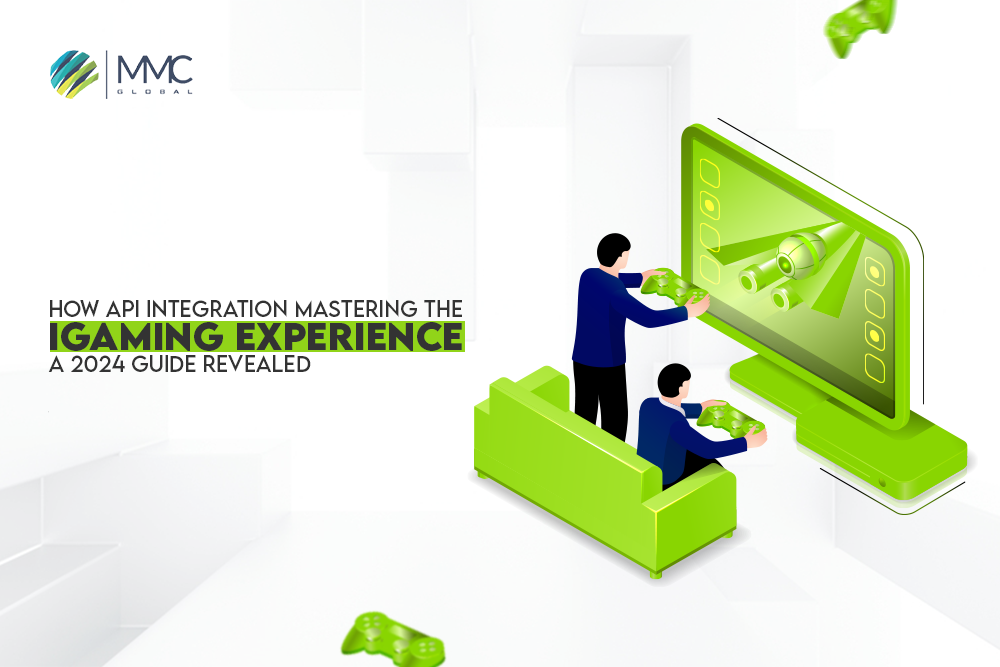How API Integration Mastering The iGaming Experience – A 2024 Guide Revealed


In the ever-evolving landscape of iGaming, the integration of Application Programming Interfaces (APIs) is the cornerstone, propelling the industry toward unprecedented possibilities. As we enter the future, the convergence of technology and gaming is poised to redefine the player experience, and API integration platforms will be the driving force behind this transformation.
From seamless game aggregation to cutting-edge advancements in artificial intelligence and blockchain, APIs are not merely connecting systems but orchestrating a symphony of innovation within the iGaming sphere. In this dynamic environment, API integration is shaping the present and charting the course for a future where the boundaries between reality and virtual gaming experiences blur. Let’s explore how the unfolding chapters of iGaming revolutionize how players engage with online entertainment.
What Is API Integartion?
API integration, or Application Programming Interface integration, refers to connecting and enabling communication between software applications through their APIs. An API is a set of rules and tools that allows one software application to interact with another. It defines the methods and data formats applications can use to request and exchange information.
Major Functions of API Integration
APIs (Application Programming Interfaces) serve several major functions in software development. It facilitates communication and interaction between software applications, services, or systems.
Data Retrieval and Manipulation
One of the primary functions of APIs is to enable the retrieval and manipulation of data. Through well-defined endpoints, APIs allow applications to request specific data from a server or service, such as retrieving user information, product details, or any other relevant data. Additionally, APIs often support operations for updating or manipulating data, allowing applications to create, modify, or delete information.
Functionality Integration
APIs enable the integration of external functionalities into an application without building those functionalities from scratch. For instance, a mapping API can be integrated into a mobile application to provide location-based services or a payment gateway API can be integrated to enable secure online transactions. Moreover, functionality integration allows developers to leverage existing services and focus on the core features of their applications.
Interoperability
APIs facilitate interoperability between different software systems, allowing them to communicate and share information seamlessly. By defining a standardized set of rules and protocols, APIs ensure diverse applications can understand and interpret the data exchanged. Moreover, it promotes compatibility and collaboration across various platforms.
Automation
APIs play a crucial role in automating processes and workflows. Applications can communicate with each other programmatically through APIs, triggering actions or exchanging information automatically. In fact, Integrated APIs for automation enhance efficiency, reduce manual intervention, and enable real-time responses to changes or events in the integrated systems.
Security and Access Control
APIs often include authentication and access control mechanisms to ensure that only authorized users or applications can access specific resources or perform certain actions. The security and access control API integration assists in securing sensitive data and maintaining control over who can interact with the API. Therefore, it prevents unauthorized access and potential security breaches.
Versioning and Updates
As software evolves, APIs provide a way to manage changes and updates. Versioning allows developers to release new versions of an API without disrupting existing integrations. This ensures that applications relying on an API continue functioning as expected. Even as the underlying API undergoes improvements or modifications.
Error Handling and Reporting
APIs define clear error-handling mechanisms, allowing applications to understand and respond appropriately to error conditions. This ensures robustness in the communication between applications, providing meaningful feedback when issues arise and helping developers diagnose and address problems effectively.
What are The Types Of API-based Integration?
The diverse types of API-based integrations showcase the adaptability and versatility of APIs in addressing various requirements across different domains, industries, and use cases in modern software development. The choice of integration type depends on factors such as data structure, communication needs, and the specific functionalities required by the applications involved. API-based integrations come in various forms, catering to different needs and scenarios in software development. Here are several diverse types of API-based integrations:
RESTful API Integrations:
REST (Representational State Transfer) APIs are widely used for web-based integrations. They use standard HTTP methods and are known for their simplicity, scalability, and stateless nature.
Use Cases: Commonly employed for web and mobile application integrations, social media API interactions, and cloud service communications.
SOAP API Integrations
SOAP (Simple Object Access Protocol) APIs use XML as their message format and often rely on HTTP or SMTP as the transport protocol. They provide a standardized approach to communication.
Use Cases: Commonly found in enterprise-level integrations, such as in financial systems, healthcare, and other scenarios where strict contract and security features are required.
GraphQL API Integrations
GraphQL APIs allow clients to request only the needed data, providing more flexibility than traditional REST APIs. Clients can specify the structure of the response, reducing over-fetching or under-fetching of data.
Use Cases: Suitable for scenarios where clients have varying data requirements, such as in content-heavy applications or when building efficient and responsive user interfaces.
Real-Time API Integrations
Real-time APIs enable instantaneous data exchange between systems, allowing for immediate updates. This is crucial for applications where timely information is critical, such as in live chat, collaboration tools, or financial techniques.
Use Cases: Real-time analytics, messaging applications, stock market data feeds, and collaborative platforms.
Payment Gateway API Integrations
Payment gateway APIs facilitate secure and seamless online transactions. They handle payment processing, including authorization, capturing, and refunding, ensuring the security of financial transactions.
Use Cases: E-commerce platforms, online marketplaces, and any online payment application.
Social Media API Integrations
Social media APIs allow applications to interact with social platforms, enabling features like user authentication, posting updates, retrieving user data, and integrating social sharing capabilities.
Use Cases: User authentication through social accounts, social media posting and monitoring, and social engagement features in applications.
Cloud Service API Integrations
Cloud service APIs enable communication with cloud platforms, facilitating interactions with cloud resources such as storage, computing power, and databases.
Use Cases: Integrating applications with cloud services like Amazon Web Services (AWS), Microsoft Azure, or Google Cloud Platform for scalable and flexible computing resources.
Webhooks
While not a traditional API, webhooks facilitate real-time communication by allowing one system to notify another about events or updates. Instead of pulling data, the receiving system is notified when there’s new information.
Use Cases: Notification systems, event-driven architectures, and scenarios where immediate updates are crucial.
The Role of API Integrations In iGaming
API integration plays a crucial role in the iGaming (online gaming) industry, contributing to various gaming platforms’ seamless operation, efficiency, and innovation. However, here are some key aspects of the role of API integration in iGaming:
Game Aggregation
iGaming platforms often integrate with game providers and aggregators through APIs. These APIs enable the seamless integration of various games into a single gaming platform, including slots, table games, live dealer games, and more.
Moreover, Game aggregation APIs allow operators to offer a diverse and extensive game portfolio without developing each game in-house. It enhances the gaming experience for players by providing a wide range of choices.
Payment Gateway Integration
Payment processing is a critical aspect of iGaming. APIs are used to integrate secure and reliable payment gateways, allowing players to deposit funds, withdraw winnings, and manage their financial transactions within the gaming platform.
In fact, seamless payment integration enhances user experience, ensures the security of financial transactions, and supports various payment methods to cater to a global audience.
Player Account Management
APIs are employed to integrate player account management systems. It enables functionalities such as player registration, login, account balance updates, and profile management. Efficient player account management APIs contribute to a user-friendly experience, allowing players to easily create and manage their accounts, track their activities, and personalize their gaming preferences.
Real-Time Data Feed
APIs facilitate the integration of real-time data feeds for events like sports betting, live dealer games, or in-play gaming. Real-time updates are crucial for providing accurate and up-to-date information to players. As a result, real-time data feeds enhance the excitement of live gaming experiences. Enable timely sports betting decisions and contribute to a dynamic and engaging gaming environment.
Affiliate Program Integration
Many iGaming platforms operate affiliate programs to collaborate with marketing partners. APIs integrate affiliate tracking, reporting, and commission payout systems. However, affiliate program integration through APIs automates the monitoring of player referrals, ensures accurate commission calculations, and provides transparency for both the iGaming operator and affiliate partners.
KYC (Know Your Customer) Verification
APIs are employed for integrating KYC verification services. It helps iGaming operators comply with regulatory requirements and ensures players’ identity and age verification. Eventually, seamless KYC integration enhances the security and compliance of iGaming platforms, preventing underage gambling and meeting legal obligations in different jurisdictions.
Regulatory Compliance
APIs play a role in integrating compliance tools and services, ensuring that iGaming platforms adhere to regulatory standards and requirements in various regions. Compliance APIs help iGaming operators stay abreast of legal and regulatory changes, ensuring a secure and trustworthy gaming environment while avoiding potential penalties or legal issues.
Entering In The Future of iGaming Experience
The future of iGaming is poised for transformative growth, and API integration platforms will play a central role in shaping this evolution. As technological advancements accelerate, iGaming operators will likely leverage more sophisticated APIs to enhance the gaming experience. Game aggregation APIs will evolve to seamlessly integrate cutting-edge content, fostering a more diverse and immersive gaming portfolio.
Integrating AI and machine learning through APIs will enable personalized gaming experiences, with platforms adapting to individual player preferences in real time. Furthermore, expanding blockchain technology may introduce decentralized gaming ecosystems, offering increased transparency, security, and fairness through API-enabled integrations.
Compliance-focused APIs will become increasingly sophisticated as regulations evolve, aiding iGaming platforms in navigating complex legal landscapes. The convergence of APIs with augmented reality (AR) and virtual reality (VR) technologies may create new dimensions in online gaming, providing players with immersive and lifelike experiences. Overall, API integration platforms will be at the forefront of driving innovation, scalability, and collaboration within the iGaming industry, ensuring a dynamic and engaging future for operators and players alike.
